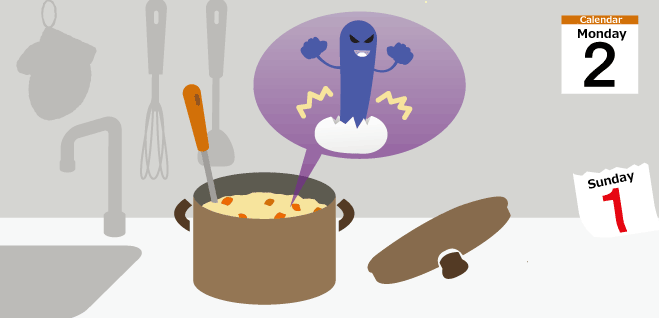Tokyo Food Safety Information Center » Tokyo Metropolitan Government food safety FAQ » I like to eat leftover curry on the next day after cooking, but I hear that this may cause food poisoning. Is it true?
I like to eat leftover curry on the next day after cooking, but I hear that this may cause food poisoning. Is it true?

I like to eat leftover curry on the next day after cooking, but I hear that this may cause food poisoning. Is it true?

It is true that there is a risk of food poisoning but you do not have to worry only if you take appropriate measures.


【Why does leftover “second-day” curry cause food poisoning?】
- Eating curry kept for long hours after cooking may cause food poisoning due to bacterium called Welch bacillus.
- In addition to curry, food cooked using a large pan, such as stew and nikujaga (stewed meat and potatoes), may cause food poisoning in many cases.
【What is Welch bacillus?】
- Welch bacilli broadly exist in the world of nature, such as inside of animal intestines and in soil.
- Welch bacilli characteristically create shells called spores to survive heat during cooking.
- Therefore, if curry, or other dishes, are kept at room temperature after cooking, Welch bacilli that have survived the heat of cooking in the form of spores actively propagate in the food as the temperature decreases and becomes suitable for propagation. Consumption of the re-contaminated food causes food poisoning.
【How to prevent food poisoning from Welch bacilli】
(1) Do not allow Welch bacilli to propagate.
- Avoid saving food cooked on the previous day to discourage the propagation of Welch bacilli. Consume food as soon as possible after heating.
- If you unavoidably keep food after heating, reduce the time when the food falls within the temperature range where Welch bacilli easily propagate (12-50℃: Especially active at range of 43-45℃). For example, separate the food into smaller portions in small containers and refrigerate them as soon as possible.
(2) Kill and reduce Welch bacilli after possible propagation.
- In food the temperature of which has lowered after heating, Welch bacilli ordinarily exist not in the form of spores but in the form of trophozoites, which are weak against heat. Therefore, heating can reduce the number of these bacteria. The fewer the number of bacteria, the lower the risk of food poisoning.
- Before eating curry, etc., after storage, reheat them until simmering to disinfect. In addition, stir the food thoroughly so that the whole amount is evenly heated.